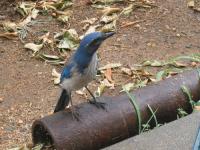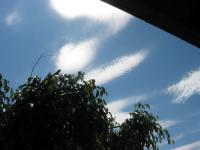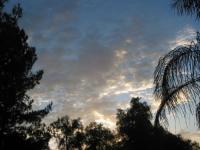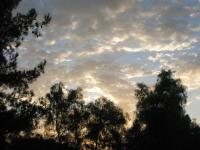February 6, 2009
It doesn’t seem possible that we can already be one month and six days into 2009. I’ve been posting so infrequently that the blog barely has a pulse. But it is alive I assure you. It’s just been sleeping, dreaming if you will.
It’s raining and stormy today and I’m grateful for that. I think this is only our fourth big rain of the season so far. My cat Tara had a bath a few days ago on a warm, sunny, dry day that got to 80 degrees and seems to have become typical weather this winter. At least it’s been easy on the heating bill. Not so easy on the water bill or my sinuses.
I’ve been away from blogs except to post my ramblings about Tarot at Spirit Blooms. I’ve worked off-line at my other computer on artwork, read or posted on a couple of favorite Internet forums (more than I should), and searched out alternatives on- and off-line to spending money that I don’t have on books that I dearly want. I started out reading about Carl Gustav Jung; now I’m reading the writings of Jung himself, beginning with his autobiography written late in life, Memories, Dreams, Reflections . Still deep in my J. R. R. Tolkien adventure, I recently finished reading The Annotated Hobbit, and now I’m savoring The Lord of the Rings. I’m a little shocked by how much watching the movies in the interim has botched my memory of the original story. Still they’re excellent movies. One should appreciate each on its own merits, the novel and the movies as separate creative entities. To do the written story complete justice there would’ve had to be nine or more movies instead of three. Not that I would complain, but not everyone is the Tolkien fiend that I am. Up ahead I plan to continue with The Silmarillion
. Still deep in my J. R. R. Tolkien adventure, I recently finished reading The Annotated Hobbit, and now I’m savoring The Lord of the Rings. I’m a little shocked by how much watching the movies in the interim has botched my memory of the original story. Still they’re excellent movies. One should appreciate each on its own merits, the novel and the movies as separate creative entities. To do the written story complete justice there would’ve had to be nine or more movies instead of three. Not that I would complain, but not everyone is the Tolkien fiend that I am. Up ahead I plan to continue with The Silmarillion and The Children of Hurin. Perhaps others, who knows? I’m taking my time, reading mostly late in the evening before sleep, if I’m not too tired by then.
and The Children of Hurin. Perhaps others, who knows? I’m taking my time, reading mostly late in the evening before sleep, if I’m not too tired by then.
Eric Mayer mentioned, in his comment on my earlier post about rereading favorites, that he almost never rereads books. I’ve been the same way most of my adult life. I reread a lot when I was a teen and young adult, but at some point I realized there was plenty in print to read the first time around, and life was short. I felt that I’d miss out on too many other things if I spent my time rereading favorites.
I’ve changed my attitude about that again only recently. This has to do partly with some of the newer fiction that I’ve been dissatisfied with, partly with my budget, and partly with the tiny library here in town where the tastes of the librarians don’t seem to mesh with my own — or I’m just quirky in my reading tastes. I’m sure they have some Tolkien and maybe some Jung, but I’ve come to prefer to take my time and not feel constrained by a return date anyway. I tried writing reviews here for a while, and I found that if the book was a library book I had to return it too quickly, and if I tried to write a review after that, I kept wanting to refer to the book. If I like it, I want it to stay around for a while. I also tried our library’s on-line interconnection with an ebook download system, but that didn’t work for me. Old computer or aging human brain inside user? Either way it didn’t work and I didn’t want to waste time fussing with it. I wanted to read the book. You know, just open a cover and start reading. If something is going to slow me down I want it to be the savor of words.
That brings me to the fourth reason I’ve gotten back into rereading. Mostly it has to do with wanting to read slowly. I’ve given up on reading everything out there. I’ve finally accepted that’s impossible. I’ve decided to hone down my reading list and read what I love — slowly, and as many times as I want.
When I reread an old favorite I don’t have to be in such a hurry to get to the end. I already know how it ends. There is something to the first bloom of a new story, that first time through when it’s a path of discovery, recognition, and suspense. But this time I can pause and enjoy the language along the way, let the suspense build again slowly. My old favorites have language worth pausing for. The more commercial books today tend to be heavy on suspense and bizarre plots and twists, while they seem too often short on the kind of writing I savor. Many feel to me as if they’re written in too much of a hurry, or as if the writer didn’t even like the story he was writing. The secret to great writing, I think, is for the writer to so love the story that he’s reluctant to leave it. Chances are the reader won’t want to leave it either.
But then I’m not a hurrier, never have been. I think it’s too easy to get into an “I’ll miss something if I slow down” mindset in our day and age, though it’s a valid concern to some degree. In the work world, one must hurry enough to show up when needed, and if one slows down one is in danger of not getting important work done, of missing opportunities, or of not being able to do one’s job anymore because one hasn’t kept up with hyperactive technology. There are sometimes valid reasons to hurry. I don’t want the emergency room team to dawdle, or firefighters to take their time arriving at a fire. For readers who want to keep up, there’s such a huge amount being published, in spite of aspiring writers’ concerns that no one is publishing what they write, that it’s easy to think one has no time to reread or to read slowly the first time. There are also such a great number of people who want to be writers that it doesn’t appear we’ll ever have a shortage of reading material, even very good reading material leaving out the bad. It’s a crowded world full of people with something to say, many of them excellent writers.
Still I think we miss out on too much by trying to do or read everything. I’m not well-read, mainly because I’m a slow reader. Maybe that’s why I appreciate books that take a long time to produce. I can sense the love and time that was put into them. I can linger, relish, and wonder why. I can spend a relatively equal time enjoying them, and feel gratitude that the authors took the time to do it right.
Tolkien took something like 13 years to write The Lord of the Rings between 1937 and 1949. He took longer, when one considers all the thought prior to beginning it that he put into creating the world of Middle-Earth, from the time he was a boy, and the time between 1949 and 1954 that he worked with his publisher to get everything just right. That time shows. And it’s not as if by taking that long he missed out on sales, which seem these days so unforgiving of anyone lagging behind. The only time any of his books went out of print was during Word War II and the after-war years, when paper was rationed in England. Oh, and there was the problem of some proofs being destroyed in a bombing or a fire (I don’t remember which) that caused further delay in getting one edition of The Hobbit back into print. Of course one important factor in his print longevity was in being Tolkien. There have been many imitators and, as Eric seemed to hint in his comment, most imitations have not held up very well. Time is, I think, one reason.
I’m certain that the biggest problems with many books is that they’re devised and written in too much of a hurry, and because they aren’t true to the writer’s own creative promptings. I can see some publisher urging a writer to create something like Tolkien wrote, but to do it right now. Imitation done in a hurry can rarely hold up to the proper process of creation. Sometimes, but not usually. Imitation as a whole is an iffy and questionable practice. Readers may say they want another story like The Lord of the Rings, but they’re not saying they want an imitation. They want more Tolkien, and that’s simply the best possible compliment to the original creator, not to any would-be imitator. Perhaps we sometimes, as readers, make the mistake of confusing the two ideas ourselves and go looking for another Tolkien when we should be looking for something else that’s new and fresh, and over which someone labored long and lovingly.
It’s been said that most of a writer’s work doesn’t take place at the typewriter or keyboard, or even necessarily with paper in hand. It happens inside the mind of the writer. I personally think every writer’s workspace needs a comfy couch, or a bed, and a window with a view of a natural setting or garden, as well as an immense library. I also think it’s safe to say that most great fiction writers have lived what they write. By that I don’t mean they’ve experienced it in physical reality. I mean they have a fertile and active imagination, an ability to visualize the experiences they haven’t actually lived. A relentless imagination at that. We use our imaginations to read, but the writer uses his imagination far more, over and over again, actively reliving the scenes he writes in his mind, working them out until they feel right, until he’s ready to translate them into written language. They get to know their own unconscious realms and facets of their own characters, as well as the archetypes of the collective unconscious, even more than we do ordinarily when we dream at night.
Now I know that some writers create at the keyboard on the fly. I’ve done that too. But the stories I’ve written that I felt best about were usually those that I had in mind for a long time before I dared to put any words down. They were an integrated collection of many things that occurred to me, including some fantasies, day dreams, things I wondered about, and even whole scenes, characters, or settings that occupied my mind well before I realized they’d formed anything close to a story worth sharing or writing down. Some were ideas I couldn’t put away because they begged to be told.
Fast writing may be part of the problem. I once rewrote a novel (Snow Angels) in the course of a few weeks, retyped the whole thing from scratch, from my head. But that story had been in my mind for a long time, in various forms, and even on paper in a few forms, before I did that. I’ve never taken part in NaNoWriMo, but I think it is possible for it to produce something of value, provided there’s something already percolating in the writer’s mind before they begin, perhaps for years before they begin typing it out. I’ve done fast writing exercises, and I know they have their value. But I wonder if the trend in fast writing is the reason so many new books I read leave me flat these days.
There is fast writing that’s great, and there have been many great prolific writers. But if we make the mistake of thinking their greatness lay in their proliferation, we do them a disservice. The secret to great writing also doesn’t lie in taking forever to produce something. I’m sure there are plenty of slowly written pieces of rubbish passing for fiction. But prolific writers are the exceptions to the slow writing rule, I think, and like Mozart’s music, great fast writing is great for other reasons than its speed of production or lack of revision. Of course everyone should write at their own speed, but fast writing of a single draft usually requires slow thinking up front, and long, slow revisions afterward. If one doesn’t take the time to do it right, to follow through, to consider it worth some effort, then even that smaller portion of fast writing time is wasted, not to mention the time anyone else takes to read the result. If it’s not worth spending lots of time writing, then maybe it’s not worth reading either.
In spite of how long Tolkien’s work has remained in print, it’s still possible that work of this kind is best done for oneself, with any idea or intent of publishing as a mere afterthought. One should, after all, consider oneself worth writing well and respectfully for. From what I understand of Tolkien, he only shared what he created with a few colleagues, friends, and his children, until the friend of a friend mentioned the possibility of publishing The Hobbit. Maybe that’s why it’s so good. He took time to shape and polish it to be what he wanted for himself and those he loved. Only after that did he shape and polish it for publication. Surely that provided him a great deal of satisfaction in what he wrote, regardless of whether strangers in his own land or across the pond liked it later on. He was also a real-life expert regarding myths of a world similar to the one he created and regarding the language he used to create it. But was he an expert who happened to come up with a story he was best suited to write, or was he a writer in the making, even as a child, who lived in his head creating a world first and who worked all his life to become expert at just what he needed to recreate that world on paper? Either way, he took his loving time about it, and that’s a good thing for all of us. After all, what’s the rush?
— Barbara @ 1:55 pm PST, 02/06/09
July 8, 2008
Our summer weather has set in, likely until mid to late October, so I have to wake up early to get all my outdoor work done. I’m amazed how fast things can grow in the warm weather and get away from me — mostly things I don’t want to grow, like weeds.
My usual care to wear gloves when working in the yard had lapsed recently, but working outside earlier than usual this morning meant that I happened across two black widow spiders. One, on the lower rock wall, was attempting to kill a big iridescent green June Beetle, or what we call a June Beetle here, aka Fig Eater Beetle. The beetle was 10 to 15 times the spider’s size. Their struggle mesmerized me for a moment as I wondered who would win, the beetle snapping spider silk as quickly as it wrapped around it. It was the noise he made that drew my attention in the first place. I would’ve intervened, if I’d had something handy to kill the spider with, but the next time I walked past, the spider — hiding from me, no doubt — was nowhere to be seen and the beetle was bumbling away. I’ll be more careful to wear gloves and not work in flip-flops anymore, unless I’m only watering. Black widows usually hide from people, but I don’t want to surprise one.
My little friend Tara is growing fast. A kitten in the house means lots of interruptions to play, or to stop misbehavior in its tracks, or just to cuddle. I’ll try to post an updated photo later, but it might be a blur unless I catch her when she slows down to nap, bask in a sunny window, or watch TV. She’s now more than three times the size she was when I took these pictures, and darker since her kitten fluff has been replaced by a true dark tabby coat. She’s a Siamese mix, but you wouldn’t know that to look at her.
Tara watched Mikhail Baryshnikov dance, in an older video on the arts channel last night, and I think she decided he’s the most cat-like human she’s seen. I hope she doesn’t expect us to move like that! But maybe it’s good that she knows some humans are capable of it, just to help us keep the upper hand. Sometimes we call her Rocket Cat, and one day recently, as the dog and I watched in glazed over amazement while she raced around and up and down a room, I commented to him, “You know, cats can almost fly.” Indi seemed to agree.
I’m not really sure what all else keeps me busy, but there’s a lot of it, whatever it is. I don’t work in the garden enough to excuse not blogging, but I do spend some time finding things to do with the excess produce.
We’ve had loads of squash from just four plants, so far, some of it now in the freezer and some given away. We may need a bigger freezer if I keep gardening. One way that we like zucchini is simply sautéed in a little olive oil with basil, oregano, salt, and pepper. We’ve had some cucumbers, which I personally think would make a good breakfast food, because just one bite seems to wake me up with its fresh, clean crispness. The tomatoes got a late start (from seed), so we haven’t had any to eat yet, but they’re blooming and setting fruit, growing like mad in the heat. There’s a San Marzano Roma about the size of the end of my thumb that I predict will be the first to the table, unless that little cluster of marble sized cherry tomatoes beats it to perfect redness. With the salmonella scare still pretty much a mystery I’m looking forward, even more than I expected when I planted them, to fresh homegrown tomatoes.
Yesterday we discovered how well extra garden produce can pay off, when we gave a large zucchini to a neighbor boy to take home, and later his mom sent over four of the most perfect little quesadillas I’ve ever tasted. Oh. My. God. These were not the quesadillas you find in Mexican restaurants, or the floppy things we usually concoct with flour tortillas and cheddar cheese, in a skillet. Every part of hers was homemade, including flaky six-inch corn flour shells folded in half and crisped. They were filled with chicken, some kind of white cheese, possibly one of the Mexican cheeses described here, and fresh cabbage, and they came with a magical homemade chili sauce to pour over them. I am positive we got the better end of that exchange. You can’t get food like that in any restaurant, and I’m in heaven just remembering them. It’s odd how a really good hot sauce can actually cool you. As my mouth heated up, my body seemed to cool right off. Must’ve been all my pores and sinuses opening. It was positively delicious. Mmmmh!
— Barbara @ 12:49 pm PST, 07/08/08
March 17, 2008
That title sounds like a metaphor for something, maybe political. But it’s not.
Earlier I wrote about the Ringed Turtle Dove I spotted one morning under our pine trees. I’ve been keeping a lookout for it, and have since seen it with a second dove, and the two of them courting. I think maybe they’re nesting in the pepper tree in the yard behind and downhill from ours. They like to hang out in our back yard, and I’ve seen them on the ground, on the fence, on the satellite dish, in the palm tree, in the pine tree, and on the old aerial antenna on our roof.
I also wrote earlier about the Red-Shouldered Hawks and Red-Tail Hawks in the neighborhood. I’m not sure which it is that’s been stalking the doves, but at one point yesterday I went out back and saw one of the doves perched on the satellite dish. As it sat there, I saw a hawk swoop out of the sky, diving for something in a yard two houses up the hill. I think it was a Red-Tail. The dove apparently didn’t see, or wasn’t concerned, even as the hawk flew over our yard, without any prey I could see. Disappointed, I suppose. The dove remained sitting there calmly, right out in the open, either unaware or unconcerned about the hawk.
A few minutes later, out front, I saw the hawk still flying around, getting hassled by a crow, but staying close by. When I returned to the house I took another look out back, because I’d just seen the hawk again. The dove was now perched on our back fence. I started to turn away, heard a kind of thump behind me, and turned my head. The hawk was flying away from the spot where the dove had just been. The hawk let out a frustrated cry, though, and then I saw that the dove had escaped into the nearby pepper tree. It sat there under the leaves, looking ruffled and scared. Yeah, me too. I think the noise I’d heard may have been the dove jamming off the chain-link fence into the tree with a split second to spare, but I’m not sure. It must’ve moved faster than I’ve ever seen it move.
A moment later I heard the dove cooing in the tree, but I didn’t see it sunning itself out in the open anymore yesterday, and today when I saw both doves up on our antenna, they seemed a lot more wary. The hawk, or possibly more than one, keeps circling the area, passing over now and then to see what prey is sitting out in the sun not paying attention.
I’m trying not to pay too much attention — though it’s difficult when these dramas unfold right in my back yard. It’s nature, and I love nature, but nature is dangerous at times, its beauty and peace transient at best. Today I’m keeping a respectful distance.
— Barbara @ 12:01 pm PST, 03/17/08
February 23, 2008
We’d seen it before, many weeks ago. A big bird of prey with black and white bands on its tail. The rest of it was paler than a Red-tailed Hawk, but we only caught glimpses of it flying over, and not a long enough look to identify it. We thought it was stalking the ground squirrel that moved in last summer. Maybe it was, because the ground squirrel hasn’t been around for a few days now.
Day before yesterday, we saw the big bird perch on top of the nearby telephone pole, and we got binoculars out for a really good look. Its breast, the undersides of it wings, and its beak are indeed paler than a Red-tailed Hawk’s. Its breast is almost pinkish or strawberry blond.
It’s a Red-shouldered Hawk, which is apparently found all over the eastern part of the country and along the California coast. I’d never seen one here before, not close enough to identify anyway. Our dominant hawk is the Red-tailed.
I wonder how long it’s been here, because last summer we watched what we think was a clutch of young hawks taking their first flight from a neighbor’s palm tree. Maybe this is one of the parents, back again to nest in the same tree. Or looking for the squirrel, or more squirrels. Poor squirrel, if so.
Our local birds continue to intrigue me with their variety and number. I’ve read, in a Harvard study, that this area is one of the most biologically diverse in the continental US, and that doesn’t surprise me, just basing my opinion on the birds.
I saw lots of owls from the road, when I used to leave for work while it was still dark. I’ve seen plenty of Black Phoebes here the past few weeks. I can’t seem to walk outside without spotting one of them. We have what I think may be Purple Finches, a variation from the House Finches we knew in San Diego, though I’m not certain. Some kind of small woodpecker likes the neighbor’s palm tree. We even have a small flock of feral parrots in the neighborhood, though I haven’t seen or heard them yet this year.
I’ve also seen lots of Mourning Doves, all my life, as I’m sure most people in North America have who pay any attention to wild birds. I’ve heard their mournful song since I was a girl and learned to recognize it. But this morning I heard a dove that sounded different, so I looked out the back window and saw a Ringneck Dove, also known as a Ringed Turtle Dove, under our pine trees. These doves aren’t natives. In fact they’re supposed to have been domestic for the past 3,000 years or so. But I suppose quite a few may have escaped into the wild at one time or another.
I just heard it again, out there, hiding in the pines and cooing, reminding me to post this. I wonder if it’s moved in to nest. If so, I guess it had better watch out for the Red-shouldered Hawk.
— Barbara @ 2:45 pm PST, 02/23/08
September 2, 2007
When I stopped commuting to a busy office and switched to staying home most days, I worried a little whether my new life would be too quiet or uneventful to suit me. But I’m never bored, and I’m sometimes amazed how much can happen right outside my door. I’ve been able to slow down, tune into the seasons, and let them slide gently past. I can be a mushroom, staying indoors and focusing on my inner world, as writers do when we’re working, or I can step right outside and find endless variety, especially in the forms nature takes.
I posted earlier this summer about hummingbirds. There have been lots of birds this summer. The mockingbirds twirled in cartwheel displays, showing off the white of their wings, and flew in wild, veering trajectories to catch cabbage white butterflies. They sang for hours on end, and swooped at anyone who ventured within range of their nests. A nearby rooster crows most mornings and sometimes all day. I’ve seen a phainopepla, a few hawks, loads of crows, orioles, black phoebes, brown towhees, and house finches. My husband saw a California thrasher, who sadly chose a rare time when I was at the post office to stop by for a snack of insects. Now and then a flock of common bushtits flies through, chittering in light tones. They never seem to sit still, and I like their tiny, perfect round shapes, so like the birds in picture books that I read as a child.
We’ve seen butterflies of all varieties this year, as well as plenty of bees, lizards, bats, and the tarantula hawk, and the summer has seen a variety of mushrooms sprouting in the yard, which seem to be able to blend in with their surroundings. (Click on images to view full size.)


Our daily visitors include the ubiquitous scrub jay.

I’ve noticed that a variety of clouds can inhabit different parts of the sky in the same moment.


I even got to thinking about the little fuzzy-edged ones, and wondered if painters who pour watercolor ever pour white gouache to make clouds. That sent me on a lazy search that introduced me to the work of artist Vickie Leigh Krudwig.
We’ve had our hottest weather of the year in the past two days, and today promises to be even hotter. Thirty minutes ago it was 97 degrees Fahrenheit outside. As I write this, it’s 99. Yesterday’s sighting of a swallowtail butterfly almost as big as my hand, and this morning’s sunrise, almost make up for the heat.


I’m attempting to ignore the fact that the sunrise was followed a few hours later by a 4.0 earthquake about 40 miles north of us, which jolted us to our feet. As I write this, thunderheads are forming just east, which looked like this an hour ago,

and like this half an hour later.

I don’t expect a triple whammy day of heat, earthquake, and thunderstorms. I’m looking for the next butterfly. But I may close the car windows just in case.
— Barbara @ 1:35 pm PST, 09/02/07
July 9, 2007
Gloria Steinem: In Defense of the ‘Chick Flick’:
“I propose, as the opposite of “chick flick,” films called “prick flicks.” Not only will it serve film critics well, but its variants will add to the literary lexicon.” (read article)
Maybe the term “prick” is too strong. It’s not the word I would’ve chosen, yet it answers the fact that a lot of women are put off by the tone and expression, if not the word, used when we hear the term “chick flick.”
Steinem’s editorial reminds me of something that occurred in a “Modern Fantasy” literature class I took, back in the seventies, when Mary Stewart’s first two Merlin and Arthur novels, The Crystal Cave and The Hollow Hills, were recent bestsellers. One of the young men in the class was so taken with them, he asked what other books Mary Stewart had written. I told him she’d written mostly romantic suspense in the past. I had an entire collection of her books at home, older hardcover editions gleaned from thrift store shelves. I thought when he expressed an interest that here was another new fan. But when the young man heard the word “romantic,” he took on a look of utter distaste and lost interest.
Some female mystery novelists still publish today using their first and middle initials rather than their full first names, in order to stretch past that still-existent gender barrier in many male readers’ minds, a practice reminiscent of the Brontës publishing under masculine names. One would’ve hoped that by the time this century rolled around we’d have advanced further. I don’t have statistics on this, but I’ll hazard a guess that there are more women who read and write fiction containing a predominately masculine point of view than there are men who read or write fiction containing a predominately feminine point of view.
Yet I know women, myself included, who enjoy a good action film, of the type once considered a favorite of men. Why is it that women, both in their reading and writing, as well as in movie preferences, might more readily cross old gender barriers?
Mind you, many men do take an equal interest in less violent or less action-oriented movies and books, and I admire men who are open to genres and interests considered historically feminine. I also admire women who open up more to interests previously considered masculine. More women today are sports fans than ever before, and don’t restrict their interests, as I do, to figure skating. My lack of interest is mostly due to bad experiences in physical education classes — I was that awkward, non-athletic kid always picked last for the team. It has nothing to do with my admiration of any outstanding achievement, physical or otherwise, and I enjoy watching good sports-related movies.
What is it that continues to keep some men from enjoying what they term as “chick flicks?” Is it that they truly don’t enjoy more thoughtful, slower-moving, or less action-oriented stories, once they give them a chance? Or is there another reason? Is it adrenaline addiction? (Understandable, among men and women, in today’s world, though perhaps best not encouraged.) Is it fear of what their friends will think? I’m trying not to make assumptions here. I’d really like to know, especially as a female writer trying to sell my fiction.
We all have types of stories we don’t like, or even parts of movies we like that we could do without. I personally back away from anything about child abductions, gangster movies that are overly violent onscreen, comedies that resort to tasteless bathroom humor (bathrooms have doors for a reason), and horror with too much blood and gore added for shock value. As far as I’m concerned, vomit and excrement belong off-screen. There’s enough of them in real life, and they’re not entertaining. They’re certainly not the kind of realism I’m looking for in a story.
I can understand someone not liking romance, even though I usually enjoy it provided it’s not overly sappy. But no one’s personal preference for certain types of stories and not others explains why we need the term “chick flick,” and especially not why it so often seems to be used as a derogatory term. Do the men who don’t like “chick flicks” prefer movies with only men? Is that what it boils down to?
I’m reminded of a line from Frank Herbert’s Dune regarding taking the “waters of life.” It mentions the place in their minds the Bene Gesserit mother superiors (women) fear to go, a place they believe only the fabled Kwisatz Haderach (a man) can access. The Kwisatz Haderach, once he accesses that place, becomes a superior being destined to lead his people to freedom. I wonder about the allegory Herbert intended, if any. Is there a place like that inside the female psyche, where some of the toughest men fear to go? Is that what they fear about “chick flicks?” Will they gain power if they find a way to access that, or will they lose power, possibly even die, as many men did who attempted to become the Kwisatz Haderach? Or will they simply gain a broader understanding of life and the world around them? In that case, maybe it’s worth a shot.
Gloria Steinem makes an interesting observation about power, and about nouns and adjectives in labels:
“Just as there are “novelists” and then “women novelists,” there are “movies” and then “chick flicks.” Whoever is in power takes over the noun — and the norm — while the less powerful get an adjective. Thus, we read about “African American doctors” but not “European American doctors,” “Hispanic leaders” but not “Anglo leaders,” “gay soldiers” but not “heterosexual soldiers,” and so on.” (read article)
— Barbara @ 1:35 pm PST, 07/09/07
July 5, 2007
I decided to answer your comments in a new post, since some of my responses are lengthy. You’ve given me a lot to think about and helped me reconsider my feelings about critiques. Even though I disagree with some points, as they relate to my writing at this time, you all shared wisdom that deserves attention. (more…)
— Barbara @ 7:33 pm PST, 07/05/07
April 27, 2007
A few days ago I pulled weeds for a bit, while the earth was still damp from the rain. When I needed a break, I sat in a porch chair to cool off with a glass of ice water.
As I watched, a rosy house finch landed on the top of a tall sowthistle I hadn’t gotten to yet. He began pulling seeds out of a seed puff. For every seed the bird ate he tore a few more off and cast them to the wind. I think he was looking right at me as he did it, too, as if to say, “So there!”
I don’t blame him for replenishing his food supply as quickly as I can yank it out of the ground. I just wish he hadn’t let me see him do it. I have enough trouble motivating myself to get out there and weed without a demonstration of how futile my efforts may be.
It’s all a balancing act, birds sowing weeds while I pull them. I’d better not let them get too far ahead of me. Slow down around here, and you’re done for.
— Barbara @ 4:20 am PST, 04/27/07
February 17, 2007
Less turns out to be a good thing at times in today’s corporatist economic and political scene, and especially in the publishing arena, where seven very big fish own almost everything, having devoured nearly every other fish in the water. (more…)
— Barbara @ 1:25 pm PST, 02/17/07
December 20, 2006
While watching The Ice Storm again for the fourth or fifth time recently, I was struck by how strangely prophetic the movie is when it opens with Tobey Maguire reading a Fantastic Four comic book on a train. Five years later, he starred in Spider-Man. I can’t help wondering if whoever cast him had been watching The Ice Storm and made that comic book superhero connection. It made me think how life is like that. One thing leads to another, and looking back it often seems to fit like pieces of an intricate puzzle into a perfect whole.
These are the kinds of connections that strike me after viewing movies a few times — or reading books more than once. Once I get to know a story, my focus changes and, if the depiction is sound, connections and inner workings start to reveal themselves. I see not only the primary theme, but layers of meaning, sometimes meaning no one ever intended. I like, so far, the fact that I know little about how movies are made. My lack of knowledge lets me keep the illusion alive even while I look deeper.
One of my favorite forms of interaction in movies is between humans and other animals. Horses in particular. This shouldn’t be surprising, considering the connection between horses and people throughout our shared history. But horses in movies seem significant to me because, in spite of the historical relationship, so few of us spend any time with horses today. Including me. I don’t know much about horses except that even though I’ve ridden them only three times in my life (and not very well), I love them, in real life as well as in movies and books. I ate up the Misty of Chincoteague series as a girl, and Airs Above the Ground started my idol worship of Mary Stewart’s books. When I first read The Lord of the Rings, as a teenager, I was almost as upset as Sam when Bill the pony had to be released before entering Moria. I’ve thought that if there is one tiny flaw in Peter Jackson’s movie verions of The Lord of the Rings trilogy it was that Shadowfax didn’t get more attention. He was bigger than life in the books. (But the movie version is so intense and rich that I can’t complain. I can only suggest that anyone who loves the story should also read the books.)
Maybe my fascination with horses is genetic. My mom grew up around horses. Her father traded them, and spent a lot of time at the racetrack. Her maternal grandfather, a Danish immigrant, was a rancher, and a few of her relations were cowboys, either the working kind or, more recently, the rodeo kind. My dad’s grandfather was a blacksmith. So yeah, horses must connect to my DNA somehow. Possibly to everyone’s, considering human history.
There is a special horse in the movie version of The Lord of the Rings, nonetheless. Each time I watch The Two Towers, I have to go back and play a particular scene over again. Perhaps you know it. Aragorn’s horse finds him washed up on a riverbank. The horse nudges him awake, and then kneels to help his injured rider mount. The relationship between horse and man hits me, there, every time. It’s just a movie, right? Well, a little research led me to the fact that Viggo Mortensen spent extra time with that horse during filming and even purchased the horse after finishing the movie. He went on to make his next movie, Hidalgo, with another horse named TJ, again spent lots of time getting close to the horse during filming, and again purchased the horse afterward. Old news for many fans, perhaps, but new and touching for me. I haven’t seen Hidalgo yet, but now I’ll have to.
My favorite movies are the ones with so much intricacy and detail that I can watch them over and over and see something new each time. I’m the same way with books, with poetry, with artwork of all kinds, including architecture. I like the appearance of simplicity, with complexity running deep within. I like infrastructure, lots of background and foundations we never see but sense are there. I like fine craftsmanship in all forms, and the drive to put one’s heart into one’s work. I’ve started to notice this chemistry in movies sometimes, a hint of how a cast and crew must have worked as a team, that remains as a very personal energy running through the finished product. I like to think that even what winds up on the cutting room floor has a part in that energy. That’s how the world is, after all, it’s full of interconnections and even interspecies cooperation, as well as competition, yet deceivingly simple on the surface — for all its obvious glory. The best fiction and the best artwork is, after all, a metaphor for life — at times even something beyond this life.
Which leads me to a final observation from those movies, one that led to an epiphany for me. It came to me the last time I watched The Return of the King. At the very end Frodo turns for a last glance at his friends, and his face transforms from a look of sorrow and grief to a combination of mischief, delight, anticipation, and near beatification — the same expression Galadriel wore when we last saw her a moment earlier. They remind me uncannily of accounts I’ve read of near-death experiences or of messages received from the other side by mediums. Earlier in the story Gandalf even spoke to Pippin about death, referring to it as a passage to a distant country, full of wonder and beauty.
This got me to thinking about why we love fiction, and Joseph Campbell’s perpetual examination of the power of myth.
Too often today fiction is criticized as a form of manipulation, and in many cases rightly so. We see the manipulation in advertising every day, even the most artistic of it. More and more product placement in TV, sensationalized — almost fictionalized — news rather than objective coverage, celebrity worship, so-called reality TV, politicians pumping themselves up or dragging others through the mud, and religious figures taking on exaggerated roles, promising to save us from hellfire of one flavor or another. Even in purer forms of fiction, in the quest to make money, publishers and writers pump out novels faster and faster, according to contracts and marketing ploys, seeking the next book that will be like the one that sold so well before. Stories seem to lose something in the process. They become pure entertainment and cleverly rather than artistically crafted, in a hurry, with little art remaining, little beneath the surface. A tree is cut down for something that remains on bookstore shelves for a couple of months and then is sold used for a penny at Amazon, or forgotten. The reader can begin to feel manipulated or addicted to the illusion and rapid consumption rather than edified by it.
In the midst of all this, why do we still love fiction? Why do we feel driven both to create and consume story? Is it a waste of time? Is it mere child’s play, the pastime of dreamers who need to get a grip on reality? Or is there something much deeper, an innate hunger or instinctive need at work?
If, as some philosophers surmise, and many near-death experiencers and mediums claim, this world is but an illusion, then is all fiction a metaphor for this great stage performance we call life? Plays within the play? Dreams within the dream? Is its purpose to teach us to see the difference between the smaller play and the bigger play, in order to prepare us to see beyond the greater play we act out in this life? (Which might mean Shakespeare’s Hamlet is holy scripture.) Is fiction a tool, an abstract ritual object we use to prepare us to see through that illusion and finally leave this world behind?
I wonder does that make directors, actors, publishers, and fiction writers the priests, handing out the keys to salvation in the form of story? Are theaters and libraries our true temples? Some of us would love to think so, I’m sure. What an ego pump that would be, for a few. What a power trip.
Or is the truth that each human saves himself, perhaps with the cooperation and companionship of his chosen cohorts? Does each of us take in each story and each experience and sift out those of his own choosing and discretion? Does each, in his own way, create his own story, and interpret it as he journeys through life, thus honing his ability to see past the illusion? Does each person make his own way to a deeper truth, progressing step by step toward the blazing dawn of enlightenment?
How does that come about? The best fiction, the best movies, draw us in so completely that if we let ourselves we can believe they’re real at the time we’re in the story. Is that the key to realizing how completely we can be drawn into an illusion, the key that helps us begin to see that it is possible this life, this world that seems so real and has such a hold on us, might possibly also be just a story, only an illusion? Does creating our own illusions show us how it’s done?
That’s my little epiphany, perhaps not meaningful to anyone but me. These things are personal. But I didn’t invent the possibility of the world as an illusion. Plato wrote about it in his Allegory of the Cave some 2,300 years ago, and it’s my understanding there are similar teachings in Hindu scriptures possibly more than 5,000 years old. It’s a thought probably older than that, painted on the walls of caves and leached into the earth from the ashes of ancient campfires, blown on the wind by their smoke, still inhaled each day by us. An ancient thought, as ancient perhaps as myth itself, and human self, which we explore today in the form of movies, plays, short stories and novels, through art, poetry, music — as well as through religion, history, and science. But it’s new for me to think from this perspective, and I don’t think I can ever see the fiction, fantasy, dreams, or creative endeavors I choose to partake in as a waste of time, from here on out. Not that I ever did. Some instinct in me drew me to them, and I answered. Perhaps all I’ve gained from my epiphany is an answer for those who would denigrate such as being a waste of time, of being a symptom of escaping reality or not being practical. It could be that carefully selecting my chosen forms of illusion is a way of taking greater control over my own life rather than escaping it. I can tell the “realists” who call me nothing but a dreamer to . . . watch a movie . . . read a story . . . write a poem. Get real by way of study of the dream within the dream.
Edited 12-21-2006. —BK
— Barbara @ 4:44 pm PST, 12/20/06
![]() . Still deep in my J. R. R. Tolkien adventure, I recently finished reading The Annotated Hobbit, and now I’m savoring The Lord of the Rings. I’m a little shocked by how much watching the movies in the interim has botched my memory of the original story. Still they’re excellent movies. One should appreciate each on its own merits, the novel and the movies as separate creative entities. To do the written story complete justice there would’ve had to be nine or more movies instead of three. Not that I would complain, but not everyone is the Tolkien fiend that I am. Up ahead I plan to continue with The Silmarillion
. Still deep in my J. R. R. Tolkien adventure, I recently finished reading The Annotated Hobbit, and now I’m savoring The Lord of the Rings. I’m a little shocked by how much watching the movies in the interim has botched my memory of the original story. Still they’re excellent movies. One should appreciate each on its own merits, the novel and the movies as separate creative entities. To do the written story complete justice there would’ve had to be nine or more movies instead of three. Not that I would complain, but not everyone is the Tolkien fiend that I am. Up ahead I plan to continue with The Silmarillion![]() and The Children of Hurin. Perhaps others, who knows? I’m taking my time, reading mostly late in the evening before sleep, if I’m not too tired by then.
and The Children of Hurin. Perhaps others, who knows? I’m taking my time, reading mostly late in the evening before sleep, if I’m not too tired by then.












